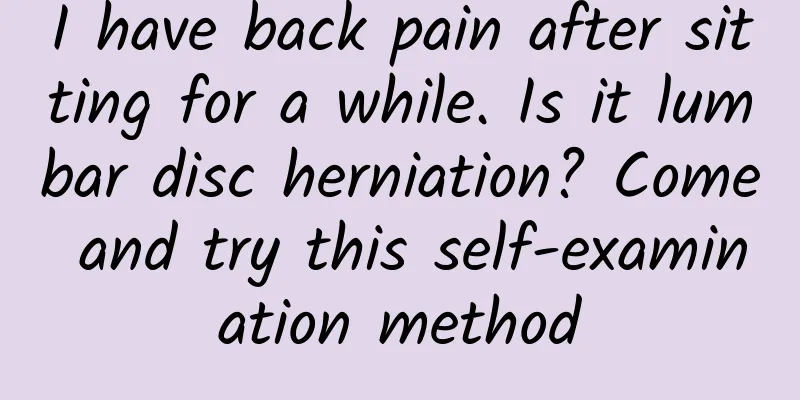I have back pain after sitting for a while. Is it lumbar disc herniation? Come and try this self-examination method

|
In recent years, the average age of patients with lumbar disc herniation has gradually decreased, causing panic among many young people. Many people do not even have lumbar disc herniation, but suspect that they have this disease because of a little discomfort or pain in the lower back. In fact, lumbar disc herniation is only one of the causes of low back pain. When low back pain is localized and there is no radiating pain in the legs or buttocks, the possibility of lumbar disc herniation is low. So how can you self-diagnose whether you have lumbar disc herniation? How to self-diagnose whether you have lumbar disc herniation? This is a test that doctors also use on a regular basis, and it is called the straight leg raise test. First, lie flat on a hard surface, which can be a yoga mat on the ground or a hard bed. Keep your whole body relaxed and stretch your legs. At this time, an assistant is needed to lift up your left leg and right leg in turn. During the lifting process, the knee joint needs to be kept straight. If, when any leg is lifted and the angle with the lying plane is not 60°, there are positive symptoms such as pain or numbness in the calf or buttocks, then it means that the person being tested is very likely to have lumbar disc herniation and needs to go to the hospital for further examination. It should be noted that when pain or numbness in the calf or buttocks occurs during the test, the test should be stopped immediately to avoid excessive damage to the nerves. If it is not possible to lie down, this examination can also be completed while sitting. The assistant holds the heel of the person being examined, gradually straightens the knee joint, and lifts the lower limb upward. When the herniated disc compresses the nerve, the patient will reflexively lean back and straighten the hip joint to relieve sciatica. The above method can be used to make a preliminary and simple self-test to determine whether you have lumbar disc herniation. The positive result of this test is most common and characteristic in lumbar disc herniation at the L4-5 and L5-S1 segments, where the incidence is the highest. Of course, even if the above symptoms do not appear in the test, if the pain in the lower back persists or even becomes more severe, you should go to the hospital for treatment. What should I do if I often have lower back pain? For those who sit for long periods of time, if they experience back pain after sitting for a while, or standing or bending for a long time, and the pain is relieved or disappears after resting in bed, and is temporarily relieved after conservative treatments such as hot compresses and massage, then they may be suffering from "chronic nonspecific back pain." This type of back pain may last for a long time, even more than 12 weeks. No organic problems were found in the hospital, but physical examination revealed increased muscle tension or obvious localized tenderness (trigger points) in the painful area. Then you need to reduce your sitting time, maintain proper exercise, and do some special training to strengthen your back muscles. These training can not only reduce the frequency of back pain, but also prevent lumbar disc herniation. |
<<: Laughing gas, angel or devil?
>>: Is fish soup more nutritious the whiter it is?
Recommend
I'm so angry! Where did it come from?
Almost all of us have experienced "belly blo...
What causes abdominal pain and vomiting? Let’s find out!
Everyone has experienced abdominal pain and vomit...
Can I have sex at 5 weeks pregnant?
You cannot have sex during the fifth week of preg...
Is the dragon blood tree easy to grow? How to make the dragon blood tree grow vigorously
Dracaena is very common among household flowers. ...
How to perform B-ultrasound examination of breast nodules?
Generally speaking, it is very common to do B-ult...
Can I get pregnant if my menstruation is irregular?
For many women who want to get pregnant, they wan...
What should you pay attention to when washing underwear?
Generally speaking, there are many things to pay ...
Do pregnant women eat vitamin d drops?
Many pregnant women supplement themselves with a ...
Can I take Ibuprofen sustained-release capsules during menstruation?
Menarche is a process that every woman goes throu...
Does eating chili peppers during breastfeeding make breast milk spicy?
Women need to pay attention to proper diet during...
Can I eat peaches during confinement and breastfeeding?
The diet of postpartum women needs attention. The...
Frequent urination and painful urination are diagnostic of prostate cancer? How to prevent prostate cancer? Kang Kang Comic Science ⑤
Kang Kang returns to his hometown to visit relati...
What is the reason for sweating during menstruation?
Women have their period every month, which is due...
Why do women lose their hair?
Female friends will experience hair loss after re...









